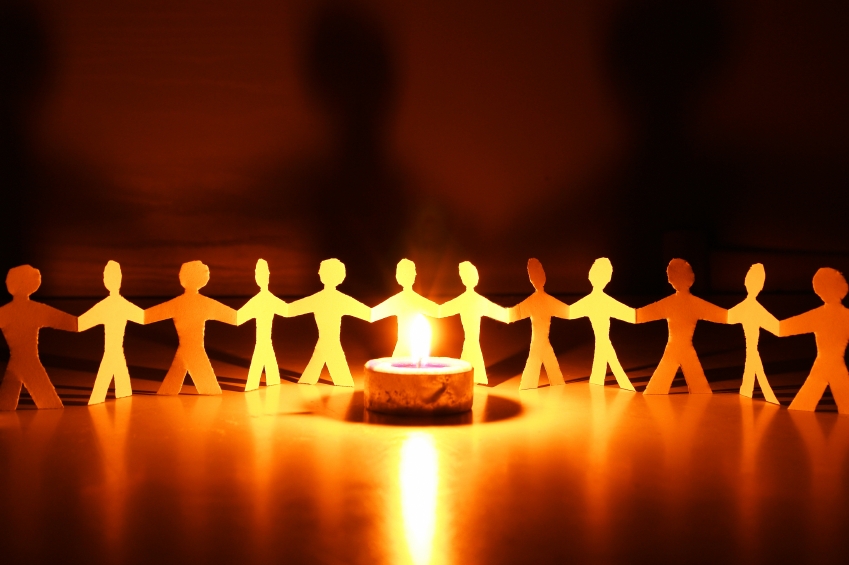If you are of Jewish decent, practicing or not, you have most likely attended a Shiva or two. If you have a lot of Jewish friends or live in a big Jewish community you may have not attended a but most likely have heard of it. For many of you out in the world you may have little knowledge of what Sitting Shiva is or means. That’s what I’m hear to share.
To Sit “Shiva” (means 7 in Hebrew) traditionally is the act of spending 7 days sitting in mourning and prayer for the loved one who has transitioned. Shiva was most often held at the home of the deceased or a close relative, where the family would not work, groom or engage in anything that could inspire pleasure while sitting on very low stools or boxes (hence the sitting part), surrounded by covered windows and mirrors. The act of Sitting Shiva is traced back through the bible Genesis 50:10, so this is an old and beautiful tradition.
Many of these very old traditions have very strict rules created through an ideal of from a very, very different time than now. We are talking a kind of strict that defines or better yet, confines your entire existence for the 7 days of mourning…by today’s standards these rules are not realistic. How are people handling their Shiva’s in this modern age and more importantly how do they feel when Shiva closes? Because when all is said and done, it is not how many traditional rules did you follow, it’s how did you feel throughout the days.
In Judaism this is how it flows…you have just lost someone very important to you and not only do you have to plan their funeral as quickly as possible (as soon as 24 hours even) but you have to have an innumerable amount of guests to your home or find somewhere where you can host these guests to attend the Shiva you are hosting for however many days you decide to host it. This could be two to 7 days with two sessions (Morning and Evening) a day. This means you have to plan for the unplannable never knowing how many guests will actually flow through your Shiva – food, drinks (all the drinks), all the goods needed to support that like flatware, dinnerware, cups, tea, stirrers, sugars, napkins…I could go on and on but you get the point.
As a guest you simply get a notification as to when the funeral will be and where and what times the Shiva will be held. You don’t have to worry about all the rules involved, you are just a guest. As host and family of the deceased there are too many rules to count, so what I encourage my clients to do is to first check in with themselves and see how they feel about what they want for themselves and what their loved one might have wanted for their Shiva. If you are reformed or even a conservative Jewish person, then you are already defining the way religion integrates into your life and so it goes for Shiva. Which means you get to pick and choose what traditional rules will apply to you and your family during your Shiva. It’s important to recognize that you get to define how you are going to spend your time mourning. What does mourning look like for you and what is your Shiva going to be for the love that you lost? In all the chaos and among all the decisions that need to be made during this crazy time one can get caught up in what they “think” they should be doing and forget what really matters is what they “want” to do, what feel aligned and right in that moment. Because at the end of the Shiva when you go for that walk around the block with your immediate family (one tradition I feel is most precious) you will not think, “oh I shouldn’t have worn leather shoes” you will be in a completely different state of being, and love.
It is my recommendation to always check into your heart, sit from a space of love, feel your way through how you want to be. What I find happens at most if not all my Shiva’s as the days progress that is so immeasurably beautiful is that they flow from mourning to memorializing. Somewhere in the middle of the experience there is what I like to call a sacred segue where everyone begins to share happy, beautiful, meaningful memories, where hearts begin to open in a most tender state and love of the life lived becomes the topic rather than love of the life lost…for me, this is why Shiva is so important, this is what makes it so incredibly special. It brings family and friends from across the world together, to focus on the thing that is most apparent, the loss of this soul and while in this communal setting for days these sacred bonds align and the love flows through which ignites a manner of healing organically shifting the perspective from loss to love…
So don’t get so crazy about following all the rules and allow yourself to follow your heart. It doesn’t have to be perfect, you are not hosting a party. You are hosting a communal event where everyone is coming together to be with you and yours in the most heartfelt way. There is no judgement, only love.




